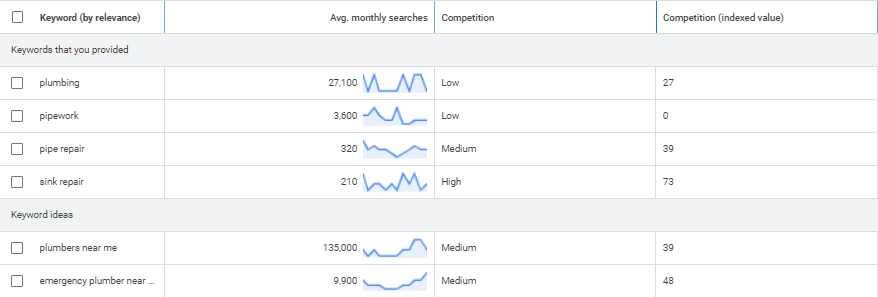How to get SEO Working for Your Website – Planning
Search engine optimisation, or SEO, is one of the most effective ways of investing in your business’s future online by attracting more repeat clients. Google Ads is a quick way to make sales, but it stops working the minute you stop paying. Meanwhile, social media posts wash away with the changing of the digital tides. The effects of a well-optimised website on the other hand, can last for a long time after its operator has stopped investing time and money in it. That’s why planning and executing SEO campaigns correctly is important.
Ideally, you need to start planning your website SEO project well in advance of any changes.
We’ve spoken to a lot of people who have decided they want some SEO from the big SEO box of tricks and have gone straight ahead, hammer and tongs. Perhaps they’ve thrown in some keywords or made some tweaks to their website’s media, adding image captions for example. This in-at-the-deep-end method is the way that search engine optimisation is popularly presented. However, it is far from the best way to go about your SEO project.
Search engine optimisation is not simply a matter of a lot of cleverly placed keywords that exist on their own. It’s an interwoven system of words, structure, strategy, geography, user reactions, sales, site assessments, and much more. For this reason, your SEO optimisation project needs to start with careful thought and planning.
Step 1: Ask basic questions
The first part of this planning involves answering some fairly general questions about your business and website.
What geographical area are you targeting?
Which search terms do you want to appear in the Google search for?
What problems do you solve for your clients? And what else might they search for to get those problems solved?
The more you know, the better your SEO
These are just the basic questions to ask about your audience. The more you know about them, the more effective your SEO, and indeed all your other marketing will be. It’s particularly important to be clear on any factors that limit your market. Perhaps your service is only useful to businesses of a certain size, or maybe a particularly strong competitor keeps you from selling in a particular city. This can help you decide on the right keywords and areas to target.
If you already have a website – Find your domain authority score
Before you can do any keyword research or insertion, you need to know your domain authority score. This is a fundamental rating of your domain designed to calculate how high your site will generally rank on search engine results pages compared to others, all other things being equal. It is calculated by Moz based on traffic, engagement, and the websites that have links leading to your domain. This is a big one, with more links from stronger sites meaning generally higher rankings. Find it here.
If you’re creating a website – Build SEO into it
Include strong keywords early on in your domain address to rank well for those keywords, but keep your website address brief. Registering your domain for a long time and using a valid SSL certificate / secure HTTPS protocol. Choosing a server hosted in your target country also provides a boost to your results in that country.
Step 2: SEO Keyword research
Create a list of all the keywords you want to rank for. Include multi-word phrases and different words for your product or service and the industry you operate in, as well as questions your prospective customers may ask that you can answer.
The first thing you need to do with these keywords is find out which ones will work well for you, getting your site found by the right people. This means finding out how many monthly searches are made for the keyword in the area you are targeting and how competitive the contest to appear on the results page is, which is fairly easy to do on one of several SEO keyword planning tools. We recommend Ahrefs, Keywords Everywhere, or Google Keyword Planner. The first two of these are subscription-based, like most SEO research and planning tools, while Google Keyword Planner is free if you spend a certain amount on Google Ads.
For an even easier option, email us and we can produce a bespoke SEO keyword report for you. This will let you know exactly what keywords to use for best effect in terms of getting found.
Researching keywords with Google Keyword Planner
- Follow this link to the Google keyword Planner and select your account from the list.
- Click beneath the search bar where the page displays your home country or the one where you are accessing the web. This will bring up a map and a box saying ‘Enter location to target.’ Input the Geographical area you want to target by searching for countries, regions, cities, or towns and clicking them until your target area is covered. Remember to delete the default ‘United Kingdom’ (or other access country) option before saving and exiting.
- Now input your keywords into the search bar, separating them with commas or pressing enter between keywords or phrases. Then press ‘Get results’. We recommend inputting 3-10 at a time. If you have more than this, group them by different offerings or sections of your website and repeat this process to avoid confusion.
- You will see a table like the one below. Note down the average monthly searches and the competition (indexed value) for each of your keywords.

5. When this is done for all of your chosen keywords, carry on down the list and add any other keywords that suit your site and business well, including the monthly searches and competition values for each.
Local keyword research
It can often be worth repeating steps 2-5 (above) for different nearby towns, counties, and regions to see how popular and competitive your chosen keywords are in each. You might be able to achieve stronger local results by adjusting your target location to maximise searches per month and minimise competition. For example, ‘Web design’ gets searched 110 times per month in East Yorkshire with a competition rating of 37. Meanwhile, in West Yorkshire, there are 720 searches per month and a 26 point competition rating. This means a company choosing between the two would do well to focus on West Yorkshire.
Step 3: Sorting your keywords
Now you need to sort your list of keywords into ones you are going to focus on at the top of your list, and ones you are going to leave in the memory banks for a rainy day further down. This is based on competition and average searches per month, with the domain scores of your search listing competitors being the tiebreaker.
Competition (indexed value)
This illustrates the intensity of the competition to rank high on the search results page from 1-100. If you represent a small-to-medium enterprise, or if you work as a freelancer, a low competition value is the most important thing to look for when deciding to use a keyword or not. Smaller enterprises and freelancers should look for competition values of 40 or below. This tells you that with a decent domain score and some careful keyword placement, you should be able to rank well for the keyword and it is worth focusing on.
Focusing on keywords with low competition values can yield the best results for those who are new to SEO marketing in the short term. Taking note of more competitive and more popular SEO keywords is worthwhile as these can provide good long-term aims or subjects for future web pages.
Average monthly searches
The number of searches made for a particular keyword per month in your chosen area. Aim to include a good variety of keywords, with frequently searched ones and rarer ones that are more specific to your website or have a good competition value. Below 50 searches a month, it may not be worth your time, though.
Competitor domain scores
What is the Domain score of other websites appearing in the top ten entries in Google search? How high up the search list does/will your website rank when your domain score has peaked?
What to avoid
Don’t be scared of including any particular keywords on your site. It won’t hurt. Just don’t waste your time focussing on general terms that are only occasionally searched. Stay away from keywords with a low search count and high competition value. The exception to this rule is when a keyword is highly specific to your business, site, or offerings and there is no better keyword to use to describe it.
Also, be sure to only pick a few (2-5) of the most relevant high-search-frequency, high-competition keywords. They may be popular, but they’re very hard to chase.
Your Results
You should now have a prioritised list of keywords with the ones that will prove most effective at the top, less effective ones at the bottom. Don’t be precious about dropping keywords that get bad results from the Keyword Planner (or other analysis tool). A lot of people have wasted a lot of time and money chasing too many difficult keywords.
This information puts you in an excellent position to start the search engine optimisation work in earnest when we show you how in our follow-up blog next month.
To plan your SEO the easy way email us with your business and website details to get a bespoke SEO keyword report.




